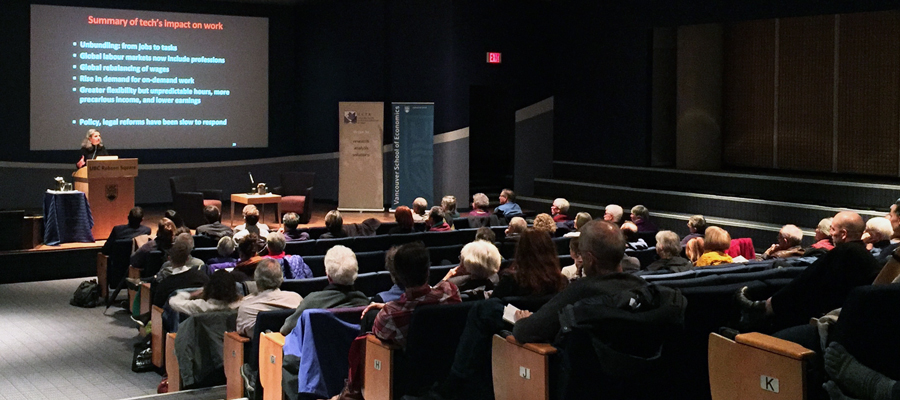Inclusive growth and the future of work: A recap of our 2017 Rosenbluth Lecture with Armine Yalnizyan

This year, the CCPA-BC’s annual Gideon Rosenbluth Memorial lecture featured one of Canada’s leading progressive economists, Armine Yalnizyan, who shared some insights on the changing world of work and the importance of achieving inclusive growth.
Making growth inclusive has become a global policy priority backed, at least on paper, by international organizations like the OECD, the World Bank and the IMF. This is a real shift in how mainstream institutions see our policy priorities because until fairly recently, the same organizations insisted that governments’ main focus should be on growing the proverbial economic pie rather than worrying about its distribution.
Why the change? As Armine explains, it became increasingly obvious that our economic system does not work for everyone, as more and more people are locked out of the benefits of global growth. In fact, the opposite is true: the benefits of growth have become concentrated in the hands of a wealthy few while the share of income going to workers has fallen in most Western countries for more than a generation (as shown in Armine’s accompanying slides). This has lead many to rightfully conclude that “the game is rigged” and throw their support behind populist parties, Brexit, and Trump. The resulting geopolitical uncertainty—combined with the pressures of climate change and population aging—has slowed growth globally.
In an environment of slow growth—or, as Armine calls it, “slowth”—the dangers of rising inequality have become more apparent. However, we have not yet found a way to shift to an inclusive growth model. Notably, instead of democratizing the economy, the rise of new technology and the “gig economy” are threatening to worsen inequality by further increasing corporate concentration and reducing bargaining power for workers. Armine points out that today’s corporate giants are mostly technology companies that don’t fit the old standards: they generate massive profits but employ relatively few workers, and are much harder to tax and regulate.
Business as usual cannot produce inclusive growth. Rather, we will need to change the rules of the game and rebalance the power relationship between workers and employers.
Further, technology is redefining work by unbundling jobs into smaller tasks and allowing many of those tasks to be performed by workers located anywhere in the world, creating a borderless digital labour market in which workers have little bargaining power. With increased flexibility comes less predictability for workers, more precarious income and lower earnings for many. Armine reminds us that while the technology may be new, many of the work practices it relies on are not. And the erosion of worker-level of control over their labour echoes what was true 100 years ago, when, like now, so much income was going to the top 1%. Governments have been slow to respond, leaving workers unprotected.
Armine makes a compelling case that business as usual cannot produce inclusive growth. Rather, we will need to change the rules of the game and rebalance the power relationship between workers and employers, which has been tilted too far in favour of employers.
Our government’s go-to policy response to the changing nature of work—promoting skills-training and education—is woefully insufficient. In addition to educational opportunities, workers need higher minimum wages, a strong collective voice, effective dispute-resolution mechanisms, health benefits, retirement benefits, paid time off, and affordable, quality basic services (such as housing, child care, transit and education). Yet so far, the public debate has been too focused on (limited) redistribution and not enough on changing the “pre-distribution”—on making the economy fairer to begin with.
In the end, Armine Yalnizyan sees that the future of work as a question of bargaining power: bright if we manage to reverse the erosion of workers’ power and less so if we fail. I think she’s right.
—
An audio recording of the lecture is available above. You can also download Armine Yalnizyan’s slides (PDF) here.


